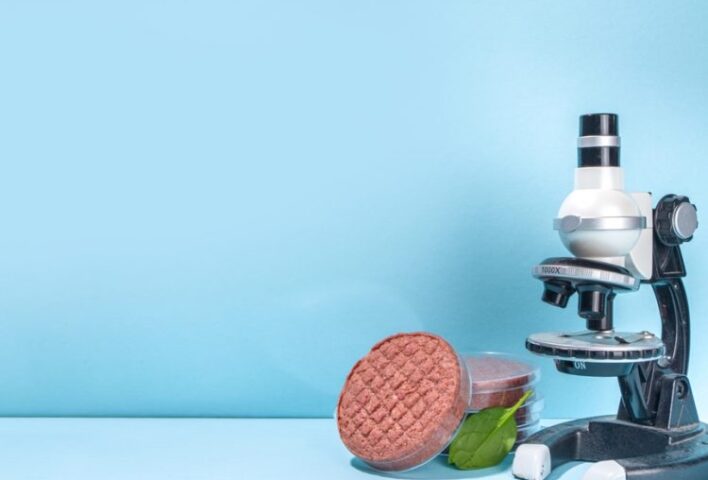A ‘meaty’ subject for debate

Our Chief Executive Richard McIlwain explores the news that two US companies have been given permission to sell lab-grown meat.
Now that two companies in the USA have now received formal approval to sell lab-grown chicken, what impact might this have, and should vegetarians and vegans support this novel food? Read on below, and let us know your views by dropping us an email at hello@vegsoc.org or in writing to our head office. We’ll aim to publish your responses in an upcoming members’ magazine.
In the past few days, you may have heard that the US Department of Agriculture has formally approved the sale of lab-grown chicken produced by two companies, Upside Foods and Good Meat. The speed of approval seems, in part, related to President Biden’s Executive Order calling for the advancement of innovation to tackle climate change and food security.
While such ‘meats’ are already available in low-regulation regimes such as Singapore, the fact that these products can now be sold in the US feels like a major step forward. But how should we react to these developments, particularly when many vegetarians and vegans object to eating any form of meat, irrespective of the mode of production?
The first thing to say is that this new product is definitely comprised of animal cells. An initial needle biopsy provides the necessary cells which can then be cultivated in the lab. Businesses seek to create infinite cell lines, i.e. selecting or modifying cells such that they continually divide and grow, which prevents having to constantly biopsy an animal. In this way, just one animal is required to provide the initial cells from which apparently endless quantities of meat can be cultured.
Of course, the reality is not quite so straightforward. In truth, many animals will be needed in order to assess and test which cells are most useful, not only in terms of growth but in terms of the taste and texture of meat. In theory, once a suitable group of cells have been chosen, growth using infinite cell lines in a laboratory should become a reality and animals will no longer be required.
Secondly, the cells require nutrients in order to grow, just as they do when still within the animal. The cells are bathed in a growth medium comprising a wide variety of nutrients and amino acids. This medium could be adjusted to provide particular nutritional profiles for health. Up until recently, the growth medium of choice was fetal bovine serum drawn from the fetus of pregnant cows at abattoirs: clearly not something any vegetarian or vegan could support. However, serum free growth media are now available; in fact, Upside Foods developed their own, as have many other companies globally.
Thirdly, it does appear that over time as these foods scale, they could be produced using power from a green energy grid and with a substantially smaller land use footprint than traditional agriculture. They would also overcome the risks associated with intensive animal farming, such as antibiotic resistance and zoonotic disease.
Finally, on the question of health, the jury is out. The debate on whether cultivated meat is healthy or at least healthier than meat is unlikely to be conclusively answered soon.
So should vegetarians and vegans be supportive of cultivated meat? We suspect the answer is a tentative ‘yes’. While we may choose not to eat it, it does appear to provide a cruelty-free alternative for those meat eaters who simply refuse to entertain the idea of cutting down or cutting out meat. This is particularly the case for processed meats, if costs can be reduced over time as the industry matures (at the moment, it’s targeted at high-end restaurants). Whether the technology can recreate a T-bone steak is another matter altogether…
As we strive for a slaughter-free food system which limits our impact on climate and biodiversity, it appears we should support this technology, even if we would never class it as vegetarian or vegan.
